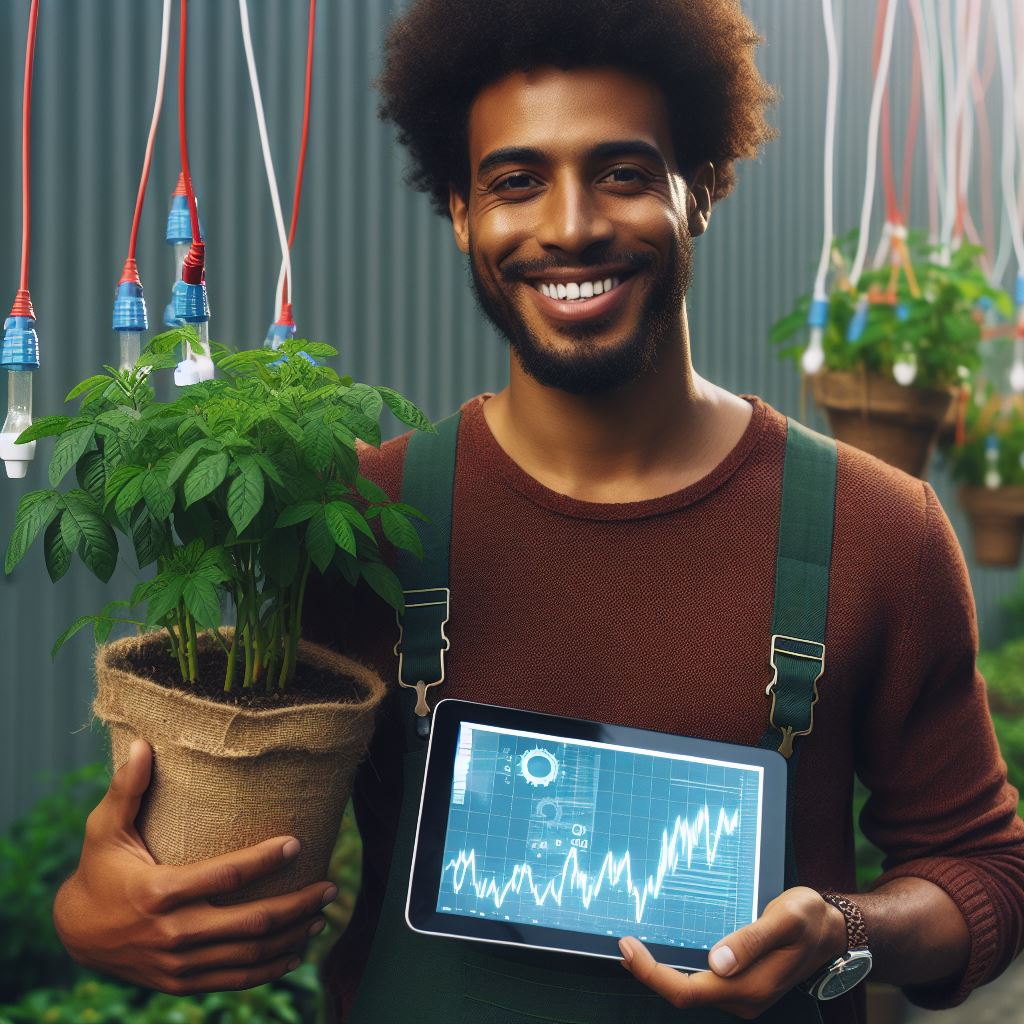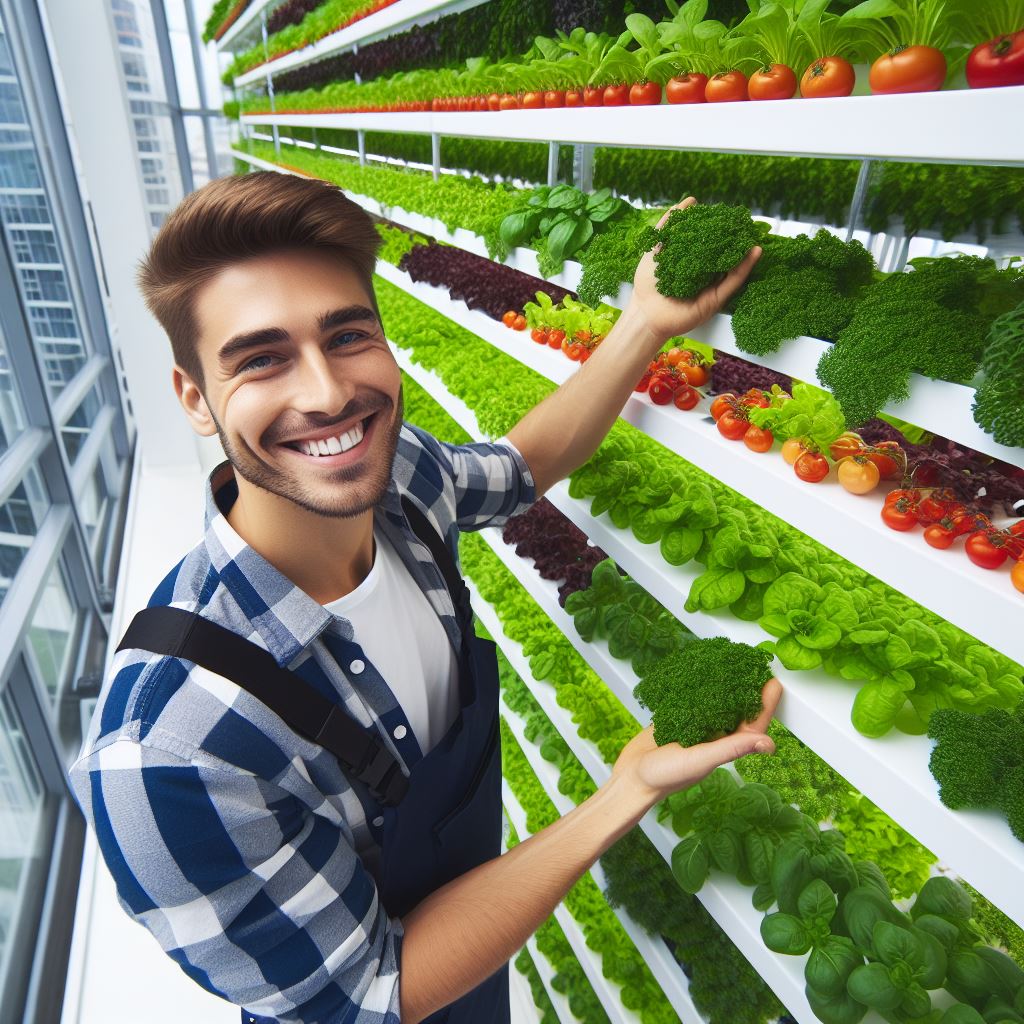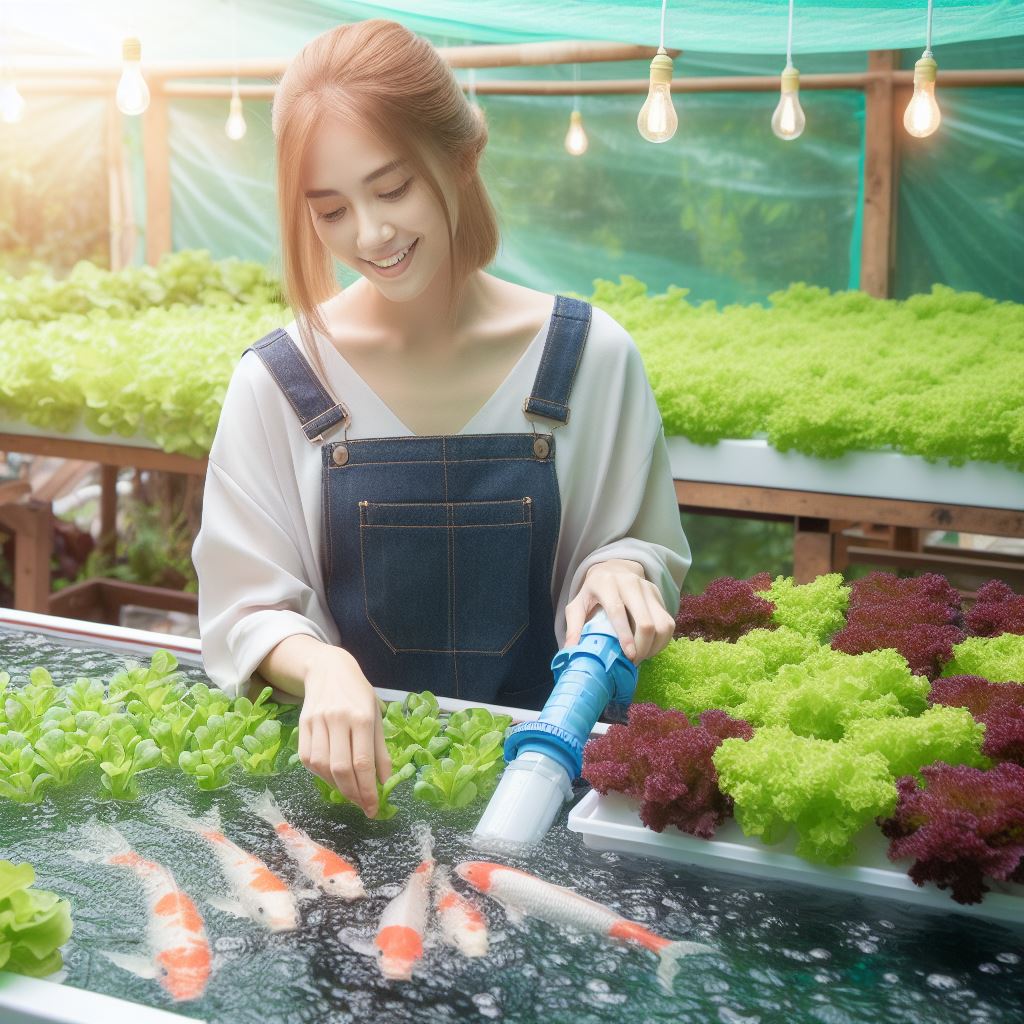Introduction
Sustainable farming plays a crucial role in ensuring a stable and productive agricultural system.
Technology is a key factor in achieving sustainability by making farming practices more efficient and environmentally friendly.
A. The Importance of Sustainable Farming
Sustainable farming is vital for several reasons.
Firstly, it helps preserve natural resources, such as soil, water, and biodiversity.
By using sustainable practices, farmers can minimize soil erosion, conserve water, and protect wildlife habitats.
Furthermore, sustainable farming promotes food security by ensuring the long-term availability of nutritious crops.
By adopting sustainable techniques, farmers can maintain soil fertility, reduce the use of chemical pesticides, and produce healthy and safe food for consumers.
B. Role of Technology in Achieving Sustainability
Technology has revolutionized the agricultural sector, offering innovative solutions to improve sustainability.
One prime example is precision farming, which uses GPS, sensors, and drones to optimize the use of resources.
Precision farming enables farmers to apply fertilizers, irrigation, and pest control precisely, minimizing waste and reducing environmental impact.
This technology also enables the collection and analysis of data, providing valuable insights for making informed decisions.
Another significant application of technology in sustainable farming is vertical farming.
By utilizing vertical spaces and controlled environments, vertical farms can produce crops all year round, save land, and minimize water usage.
In addition, advanced machinery and automation systems have made farming operations more efficient and less labor-intensive.
Robotic systems can handle tasks such as planting, weeding, and harvesting, reducing the need for manual labor and increasing productivity.
In fact, sustainable farming is crucial for preserving natural resources and ensuring long-term food security.
Technology plays a vital role in achieving sustainability by optimizing resource usage, improving efficiency, and minimizing environmental impact.
Embracing technological advancements in agriculture is essential for a sustainable and resilient farming future.
The Evolution of Sustainable Farming
In order to understand the current state of sustainable farming practices, it is important to delve into the historical context of farming.
For centuries, traditional farming methods relied on manual labor and simple tools to cultivate crops and raise livestock.
However, as population growth surged, the demand for food increased exponentially, leading to the need for more efficient and productive farming techniques.
This ultimately gave rise to the shift towards sustainable farming methods.
A. Shift towards sustainable farming methods
The shift towards sustainable farming methods can be traced back to the industrial revolution.
With the advent of new technologies, such as the steam engine and mechanized agricultural equipment, farmers were able to increase their productivity and efficiency.
However, these advancements were also accompanied by negative consequences, such as soil degradation, water pollution, and loss of biodiversity.
Recognizing the need to address these environmental concerns, farmers and researchers began exploring alternative approaches to farming.
This marked the beginning of the sustainable farming movement.
Sustainable farming aims to minimize environmental impact while maintaining long-term productivity and profitability.
This shift towards sustainability also encompassed social and economic factors, ensuring the well-being of farmers and rural communities.
One of the key factors in the evolution of sustainable farming has been the integration of technology.
Modern farming practices now heavily rely on technological innovations to optimize production and reduce resource consumption.
Precision agriculture, for example, utilizes sensors, drones, and GPS technology to monitor soil conditions, crop growth, and water usage.
This allows farmers to apply fertilizers and irrigation in a targeted manner, minimizing waste and maximizing yields.
B. Integration of technology in modern farming
Similarly, the use of biotechnology has revolutionized farming practices.
Genetically modified crops (GMOs) have been developed to withstand pests, diseases, and harsh environmental conditions, reducing the need for chemical pesticides and increasing crop resilience.
Additionally, biotechnology has enabled the development of crops with enhanced nutritional content, addressing malnutrition and food security challenges.
Moreover, sustainable farming methods prioritize the preservation of natural resources.
Conservation tillage techniques, such as no-till or reduced tillage, limit soil erosion and help retain moisture.
Cover cropping, another sustainable practice, involves planting a cover crop during fallow periods to maintain soil health and fertility.
These practices not only benefit the environment but also contribute to the long-term sustainability of the farming operation.
Furthermore, sustainable farming encourages crop diversification and the integration of livestock.
Crop rotation, for instance, involves alternating different crops in a field each season, preventing soil nutrient depletion and reducing the risk of pest infestation.
Integrating livestock in farming systems promotes nutrient cycling, as animal waste can be used as organic fertilizers, reducing the reliance on synthetic inputs.
Transform Your Agribusiness
Unlock your farm's potential with expert advice tailored to your needs. Get actionable steps that drive real results.
Get StartedIn short, the evolution of sustainable farming methods has been driven by the historical context of farming practices, the need to mitigate environmental impacts, and the integration of technology.
As we continue to face challenges posed by climate change, population growth, and resource scarcity, sustainable farming practices will play a crucial role in ensuring food security, environmental stewardship, and the well-being of farming communities.
Embracing and further developing these practices will pave the way for a more sustainable and resilient agricultural sector.
Key Challenges in Sustainable Farming
Sustainable farming faces numerous challenges that require innovative solutions and a commitment to efficiency.
Limited access to resources, environmental concerns, economic factors, and the constant need for innovation and efficiency are among the key challenges in sustainable farming today.
A. Limited Access to Resources
- Farmers often struggle to access essential resources like land, water, and energy.
- Limited access to capital and credit can hinder investment in sustainable farming practices.
- Availability of skilled labor and knowledge sharing can be limited in some regions.
B. Environmental Concerns
- Climate change poses significant challenges, including extreme weather events and shifting growing seasons.
- Soil degradation and erosion are persistent issues that impact long-term sustainability.
- Biodiversity loss and habitat destruction are threats that require conservation efforts.
C. Economic Factors
- Sustainable farming practices can be costlier to implement than conventional methods.
- Market demand and pricing structures may not always support sustainable practices.
- Access to markets and distribution networks can be challenging for small-scale farmers.
D. Need for Innovation and Efficiency
- Continuous innovation is essential to develop sustainable farming technologies and practices.
- Improving efficiency in resource use, such as water and energy, is crucial.
- Adoption of precision agriculture and digital technologies can enhance productivity and sustainability.
In a nutshell, addressing these challenges requires collaboration among farmers, policymakers, researchers, and industry stakeholders.
By investing in sustainable farming practices, we can create a path toward a more resilient and environmentally friendly agricultural sector.
Read: High-Tech Farming: A New Age Challenge
Benefits of Technology in Sustainable Farming
The benefits of technology in sustainable farming are numerous and play a critical role in ensuring the future of agriculture.
By leveraging advanced tools and techniques, farmers can improve resource management, enhance precision agriculture, automate tasks, and make data-driven decisions for better outcomes.
A. Improved resource management
Improved resource management is one of the significant advantages offered by technology in sustainable farming.
Through the use of sensors and monitoring systems, farmers can gather real-time data on soil moisture, temperature, and nutrient levels.
This enables them to optimize irrigation, fertilization, and pest control, reducing waste and minimizing the environmental impact of farming practices.
B. Precision agriculture techniques
Precision agriculture techniques further enhance resource management by enabling farmers to tailor their approaches according to specific field conditions.
Advanced technologies such as GPS, drones, and remote sensing allow farmers to precisely apply inputs like fertilizers and pesticides only where and when needed.
As a result, this reduces the overall usage of inputs, decreases costs, and minimizes the potential harm to the environment.
C. Automation and robotics
Automation and robotics are revolutionizing sustainable farming practices.
Robots can carry out various tasks, such as planting seeds, applying fertilizers, monitoring crop health, and even harvesting.
These automated processes not only save time and labor but also ensure greater accuracy and efficiency.
Additionally, robots can work tirelessly, even in challenging weather conditions, leading to higher crop yields.
D. Data-driven decision-making
Data-driven decision-making is another key benefit of technology in sustainable farming.
Farmers can collect and analyze vast amounts of data from sensors, satellites, and other sources to gain valuable insights.
By leveraging this information, they can make informed decisions about planting schedules, pest management strategies, and resource allocation.
This data-driven approach helps optimize farming practices, improve productivity, and reduce waste.
Additionally, technology facilitates better farm management through the use of smart agriculture software and applications.
These tools allow farmers to monitor and control various aspects of their operations remotely.
They can track crop growth, weather patterns, equipment performance, and even market trends.
This real-time information empowers farmers to respond quickly to changes and make necessary adjustments, leading to more efficient and profitable farming.
Furthermore, technology promotes sustainable farming by enabling connectivity and knowledge sharing among farmers.
Online platforms, forums, and social media groups provide a platform for farmers to exchange ideas, share best practices, and learn from each other’s experiences.
This collaboration helps in spreading sustainable farming techniques and encourages the adoption of innovative technologies across the agricultural community.
In essence, technology offers numerous benefits in sustainable farming.
Improved resource management, precision agriculture techniques, automation, data-driven decision-making, and connectivity contribute to more efficient, environmentally friendly, and economically viable farming practices.
Embracing these technological advancements is crucial for ensuring a sustainable future for agriculture and meeting the growing global demands for food production.
Read: Gen Z Farmers: Revolutionizing Agriculture

Technological Innovations in Sustainable Farming
Technology has revolutionized various industries, and farming is no exception.
In recent years, there has been a growing focus on sustainable farming practices to ensure the long-term viability of agricultural systems.
Technological innovations have played a crucial role in driving these sustainable practices forward, providing farmers with the tools they need to increase efficiency, reduce waste, and protect the environment.
In this blog section, we will explore some of the key technological advancements that are transforming sustainable farming.
A. Use of drones for monitoring and assessment
Drones have become invaluable tools for farmers, allowing them to monitor and assess their crops and land in a more efficient and cost-effective way.
Equipped with cameras and sensors, drones can capture high-resolution images and collect data on various environmental factors.
This data can then be analyzed to identify potential issues such as pest infestations or nutrient deficiencies, enabling farmers to take targeted action and reduce the need for harmful pesticides or excessive fertilizer use.
B. IoT devices for real-time data collection
The Internet of Things (IoT) has unlocked a world of possibilities in agriculture.
IoT devices such as sensors, weather stations, and smart irrigation systems can collect real-time data on soil moisture, temperature, humidity, and more.
This data can be analyzed and used to make informed decisions about irrigation, crop rotation, and pest management.
By optimizing resource allocation and reducing waste, farmers can significantly increase their yields while minimizing their environmental impact.
C. Sustainable energy solutions
The agriculture industry is one of the largest consumers of energy, and traditional farming practices often rely heavily on fossil fuels.
However, technological innovations have paved the way for more sustainable energy solutions in farming.
Solar panels and wind turbines can be used to generate renewable energy on the farm, reducing reliance on non-renewable resources.
Additionally, advanced microgrid systems allow farmers to store and distribute energy more efficiently, further reducing costs and environmental impact.
D. Genetic modification for crop resilience
Genetic modification has long been a controversial topic, but when used responsibly, it can have significant benefits for sustainable farming.
By introducing specific traits into crops, scientists can enhance their resilience to environmental stressors such as pests, diseases, and drought.
This reduces the need for chemical interventions and allows farmers to produce higher yields with fewer resources.
Additionally, genetic modification can improve the nutritional content of crops, addressing malnutrition in vulnerable populations.
E. Robotics and automation for precision farming
Robots and automated systems are revolutionizing agriculture by enabling precision farming techniques.
These technologies can perform tasks such as planting, weeding, and harvesting with exceptional accuracy and efficiency.
By precisely targeting resources and minimizing human error, farmers can optimize productivity and reduce waste.
Additionally, automation can help address labor shortages in the agriculture sector, ensuring that crops are cultivated and harvested efficiently.
F. Data analytics and predictive modeling
Data analytics and predictive modeling are powerful tools in sustainable farming.
By analyzing vast amounts of data collected from various sources, including weather patterns, soil composition, and crop performance, farmers can make data-driven decisions to optimize yield and minimize waste.
These tools can also help predict future challenges, allowing farmers to anticipate and mitigate potential issues before they arise.
This proactive approach saves resources and ensures the long-term sustainability of farming operations.
In general, technological innovations have revolutionized sustainable farming practices, providing farmers with the tools they need to increase efficiency, reduce waste, and protect the environment.
From drones and IoT devices for data collection to genetic modification for crop resilience, these advancements are driving the industry toward a more sustainable future.
By embracing these technologies, farmers can not only improve their own livelihoods but also contribute to a more resilient and food-secure world.
Read: Oregon Berry Farms’ Journey to Eco-Farming
Showcase Your Farming Business
Publish your professional farming services profile on our blog for a one-time fee of $200 and reach a dedicated audience of farmers and agribusiness owners.
Publish Your ProfileSuccess Stories in Sustainable Farming Technology
In recent years, technology has revolutionized the agricultural sector, providing innovative solutions for sustainable farming.
This article focuses on successful case studies of farms that have implemented these technological advancements, analyzing their positive impact on productivity and sustainability.
Additionally, it explores the lessons learned from these success stories and the potential for scaling up these solutions in the future.
A. Case Studies of Farms Implementing Innovative Solutions
- Farm A: This farm implemented precision agriculture technologies, including drones and sensors, to optimize irrigation and fertilizer usage.
- Farm B: By adopting vertical farming techniques, this urban farm maximized production in limited spaces while reducing water and pesticide consumption.
- Farm C: Through the use of smart monitoring systems, this farm successfully managed pests and diseases, minimizing crop damage and pesticide application.
B. Positive Impact on Productivity and Sustainability
- Increased Yields: Farms implementing innovative technologies witnessed significant improvements in crop yields, meeting the growing demand for food amidst global population growth.
- Resource Efficiency: Technology-enabled solutions reduced the need for water, fertilizer, and pesticides, promoting sustainable practices and minimizing environmental impact.
- Income Generation: Farms adopting these technologies enjoyed higher profitability due to increased productivity and reduced operational costs.
C. Lessons Learned and Potential for Scaling Up
- Access to Technology: The success stories highlight the importance of providing farmers with affordable and accessible technology, ensuring inclusivity in implementing sustainable practices.
- Training and Education: Farmers need to be trained on using these technological tools effectively to maximize their benefits and ensure the sustainable adoption of new farming techniques.
- Collaboration and Knowledge Sharing: Encouraging collaboration between successful farms and sharing knowledge with others cultivates a supportive ecosystem for sustainable farming technology.
- Policy and Financial Support: Governments and organizations should provide policy incentives and financial support for farmers adopting these technologies, facilitating widespread implementation.
D. Promising Future of Sustainable Farming Technology
- Increased Food Security: Scaling up sustainable farming technologies has the potential to meet the rising global food demand and ensure food security.
- Climate Change Adaptation: Smart sensors and data analytics can aid in monitoring and adapting to climate change impacts, improving the resilience of agricultural systems.
- Reduced Environmental Footprint: By minimizing water and chemical usage, sustainable farming technologies contribute to preserving ecosystems and reducing pollution.
- Rural Development: The adoption of these technologies can revitalize rural economies by enhancing productivity, creating jobs, and attracting investment in agriculture.
The success stories presented here demonstrate how technology has revolutionized sustainable farming practices.
With increased productivity, improved resource efficiency, and positive environmental impacts, these innovations hold immense potential for scaling up globally.
However, to fully realize this potential, it is crucial to ensure inclusivity, provide training and education, foster collaboration, and offer policy and financial support.
By doing so, we can promote the widespread adoption of sustainable farming technologies and pave the way for a greener and more sustainable agricultural future.
Read: Young Farmers: Breaking New Ground
Barriers to Technology Adoption in Sustainable Farming
Sustainable farming relies on embracing innovative technologies. However, several barriers hinder widespread adoption.
Understanding these challenges is crucial for progress.
A. Financial Constraints and Affordability
- Many sustainable farming technologies require significant upfront investment.
- Farmers often face challenges in securing financing for adopting new technologies.
- Lack of financial resources can limit the ability to purchase and implement sustainable farming tech.
B. Lack of Awareness and Knowledge
- Farmers may not be aware of the benefits and availability of sustainable farming technologies.
- Limited access to information and education about these technologies can impede adoption.
- Educating farmers about the advantages and applications of tech is essential for overcoming this barrier.
C. Resistance to Change and Traditional Farming Mindsets
- Some farmers are hesitant to adopt new technologies due to fear of change.
- Traditional farming practices and mindsets can be deeply ingrained and resistant to change.
- Overcoming this barrier requires a shift in mindset and demonstrating the value of tech in farming.
Addressing these barriers requires a multi-faceted approach.
Policymakers, researchers, and industry stakeholders must collaborate to find solutions.
Supporting farmers with financial incentives and access to financing can alleviate the burden of upfront costs.
Additionally, educational programs and outreach efforts can raise awareness and build knowledge among farmers.
Promoting a culture of innovation and providing support for farmers transitioning to sustainable practices are also crucial.
By working together, we can overcome these barriers and pave the way for a more sustainable future in farming.
Government Initiatives and Support
A. Policies promoting sustainable farming technology
The government plays a crucial role in promoting sustainable farming technology through various policies.
These policies aim to encourage farmers to adopt innovative techniques that minimize the impact on the environment.
By implementing policies that incentivize sustainable farming practices, the government sets the stage for a more sustainable and resilient agriculture sector.
B. Investment in research and development
To further support sustainable farming, governments invest heavily in research and development.
This involves funding research projects focused on developing new technologies and practices that enhance productivity while minimizing environmental degradation.
By investing in R&D, governments pave the way for the advancement of sustainable farming methods that can help address challenges such as climate change and resource scarcity.
C. Grants and subsidies for farmers
Governments provide financial assistance to farmers through grants and subsidies.
These programs aim to alleviate the financial burden of adopting sustainable farming technologies.
By offering financial support, governments encourage farmers to invest in technologies that reduce their carbon footprint, promote soil health, and conserve water resources.
These grants and subsidies also help bridge the gap between the cost of conventional farming methods and sustainable alternatives.
By implementing policies, investing in research and development, and providing grants and subsidies, governments demonstrate their commitment to sustainable farming.
These initiatives have multiple benefits, ranging from environmental conservation to economic growth and social welfare.
D. Benefits of government initiatives and support
1. Environmental conservation
Government initiatives promote sustainable farming practices that safeguard the environment.
By adopting technologies that reduce chemical inputs, minimize soil erosion, and preserve water resources, farmers contribute to the conservation of our natural resources.
These practices help protect biodiversity, improve soil health, and reduce greenhouse gas emissions, ultimately leading to a more sustainable and resilient ecosystem.
2. Economic growth
Through its initiatives, the government fosters economic growth in the agriculture sector.
Sustainable farming practices boost productivity and increase crop yields, leading to higher profits for farmers.
Additionally, the adoption of sustainable technologies creates new jobs in the agriculture and technology sectors.
This drives economic development in rural areas and contributes to overall national growth.
3. Food security
Government support for sustainable farming is essential to ensure food security.
By encouraging farmers to adopt sustainable practices, governments help increase agricultural productivity.
These practices also enhance resilience to climate change, allowing farmers to continue producing food even in challenging conditions.
By investing in sustainable farming, governments contribute to a more secure and stable food supply, safeguarding the well-being of their citizens.
4. Rural development
Government initiatives in sustainable farming support rural communities.
By promoting innovative technologies and providing financial assistance, governments empower farmers to thrive in their local communities.
This leads to improved living standards, increased access to education and healthcare, and reduced migration from rural to urban areas.
Sustainable farming practices strengthen the fabric of rural communities, preserving cultural heritage and ensuring their long-term viability.
Government initiatives and support play a vital role in driving the adoption of sustainable farming technologies.
Through policies, investment in research and development, and financial assistance, governments incentivize farmers to embrace practices that are environmentally friendly, economically rewarding, and socially beneficial.
By promoting sustainable farming, governments contribute to a more resilient and sustainable agricultural sector, ensuring the well-being of present and future generations.
Conclusion
Technology plays a crucial role in achieving sustainable farming practices.
It has the potential to revolutionize farming methods, increase productivity, and reduce environmental impact.
Continued innovation is essential to unlock the full potential of technology in farming.
Farmers, policymakers, and technology providers must collaborate and invest in research and development to harness these advancements.
Only by working together can we create a sustainable future for agriculture and ensure food security for generations to come.
A. Recap of the significance of technology in sustainable farming
Throughout this blog section, we have explored the various ways in which technology is transforming the agricultural landscape.
From precision farming and remote sensing to data analytics and automation, these technological advancements have improved efficiency, reduced resource waste, and increased yields.
With dwindling natural resources and a growing population, sustainable farming practices are more important than ever.
B. Future potential and the need for continued innovation
As we look ahead, the future potential of technology in sustainable farming is immense.
With the advent of artificial intelligence, robotics, and IoT, we can expect even greater breakthroughs in optimizing resource utilization, crop protection, and climate resilience.
However, to fully reap the benefits of these advancements, there is a need for continued innovation.
Technological advancements should focus on creating user-friendly solutions that are accessible to farmers of all scales.
C. Call-to-action for farmers, policymakers, and technology providers
To achieve sustainable farming practices, we must work together.
Farmers need to embrace technology and be willing to adapt their traditional methods to integrate technological solutions.
Policymakers should incentivize and support the adoption of sustainable farming technologies through regulations, funding, and education.
Technology providers must prioritize the development of affordable, scalable, and user-friendly solutions tailored to the needs of farmers worldwide.
By harnessing the power of technology in sustainable farming, we can address the pressing challenges of climate change, resource scarcity, and food security.
Together, we have the opportunity to shape a future where farming is not only productive but also environmentally friendly and socially responsible.
Let us seize this opportunity and pave the way for a more sustainable and resilient agricultural sector.




